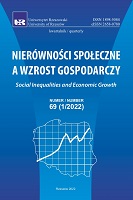Household income inequality in Poland between 2005 and 2019: A decomposition of the Gini coefficient by income sources
Household income inequality in Poland between 2005 and 2019: A decomposition of the Gini coefficient by income sources
Author(s): Patrycja Graca-GelertSubject(s): National Economy, Transformation Period (1990 - 2010), Present Times (2010 - today), Socio-Economic Research
Published by: Wydawnictwo Uniwersytetu Rzeszowskiego
Keywords: income distribution; income inequality; decomposition;
Summary/Abstract: The aim of this paper is the empirical analysis of the Gini coefficient ecomposition by income sources in Poland between 2005 and 2013. The decomposition was used to assess the contribution of income components to the overall income inequality in Poland. The empirical analysis was based on non-identifiable, individual household budget survey data collected by the Central Statistical Office of Poland. The method of decomposition by income components applied in this study was the approach of Lerman and Yitzhaki (1985). The study revealed that employment income contributed to the greatest extent to overall income inequality in Poland during the analysis period. At the same time, this income source showed a significant increase in explaining inequality, reaching almost 64% in 2019. Apart from employment, among all of the income sources analysed, only the contribution of social security benefits to income disparities changed significantly, dropping from almost 19% in 2005 to 7% in 2019. Income from self-employment explained about 15% of inequality in Poland throughout the analysed period. The contribution of the rest of income sources to income inequality was also relatively stable, though less significant. The only income category that contributed negatively to inequality was the other social benefits component. The largest impact of a marginal change in income components on overall inequality was due to income from employment (positive effect) and social security benefits (negative effect). A negative impact of a marginal change in specific income sources on inequality was observed in the case of social security benefits, other social benefits, and other income.
Journal: Nierówności Społeczne a Wzrost Gospodarczy
- Issue Year: 2022
- Issue No: 69
- Page Range: 21-38
- Page Count: 18
- Language: English

